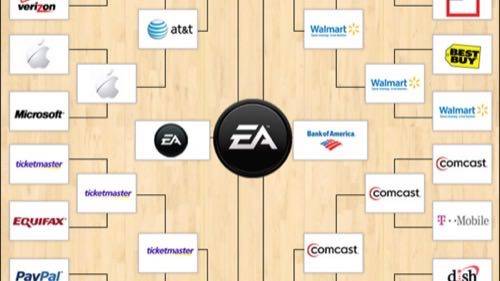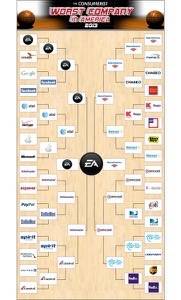
Electronic Arts, the publisher of popular video-game franchises like Madden, SimCity and Mass Effect, has done it yet again. In another highly contested match-up against Bank of America, EA has kept its iron grip on the crown for Worst Company In America.
EA’s penchant for micro-transactions, insistence on always-online requirements and overall anti-consumer activities lifted the company to “victory” yet again, with its SimCity launch disaster earlier this year perhaps the most influential of causes.
The Consumerist, a popular website owned by not-for-profit advocacy organization Consumer Reports, has held The Worst Company In America poll since 2006. The contest has come to resemble an NCAA March Madness bracket, pitting companies against direct competitors (Apple vs. Google; Comcast vs. DirectTV) before the Sweet 16 round begins crossing industry lines. This year’s Final Four also included TicketMaster and former winner Comcast.
EA clinched a surprise victory in 2012 by beating out Bank of America, AT&T and Wal-Mart in the Final Four. After taking an astounding 77.53% of the vote this year, EA kept its crown.
Video Game Publisher vs. Utility Companies & Banks?
It’s hard to imagine a mere video game publisher beating out the bank that bought mortgage-lending scapegoat Countrywide, not to mention a slew of widely reviled cell service and cable providers. As EA’s COO Peter Moore complained during the semifinals:
This is the same poll that last year judged us as worse than companies responsible for the biggest oil spill in history, the mortgage crisis, and bank bailouts that cost millions of taxpayer dollars. The complaints against us last year were our support of SOPA (not true), and that they didn’t like the ending to Mass Effect 3.
While a bit snide and self serving, Moore does raise an interesting point. Just how did a game publisher come to be so hated?
EA’s Big Mistakes
One factor promoting EA’s worst-ness is that BofA is just one hated bank among many, while EA has become the poster child for conglomerate greed and anti-consumerism in gaming. The company’s sins even put it on the ReadWrite DeathWatch list last year. Here’s a rundown of some of the bad decisions and debacles plaguing the company recently:
- The first SimCity in nearly 10 years was released last month to disastrous performance and near-universal connection issues. The cause: EA’s servers, which must be accessed with a solid Internet connection at all times just to play the game. Refunds for digital copies were not permitted.
- Microtransaction policies sucking the fun out of various games. Most recently Real Racing 3, a free driving game, included a feature that limits players to 30 minutes of playtime before they are required to pay more.
- In March, right after the SimCity launch, EA CEO John Riccitiello resigned amid failure to meet operational plans and Wall Street financial forecasts.
- EA has also presided over poor endings and seemingly rushed sequels to several highly acclaimed game series. Mass Effect 3’s final act was so poorly received that fans demanded, and received, a revised ending, and EA was sued for false advertising.
Finally, the video game world is not just a niche market any more. It’s become a pervasive, multibillion-dollar industry worming its way onto smartphones, tablets, social networks, television sets, PCs and pretty much anything else with a screen.
Can EA Snag A Three-Peat?
Peter Moore’s blog post – titled “We Can Do Better” – was more a rude and careless defense than an acknowledgement that consumers really, really don’t like his company. He even ended it by saying, “The tallest trees catch the most wind. At EA we remain proud and unbowed.” Learning from mistakes is always difficult for big corporations, but EA seems determined not to pay attention to the blow-back on micro-transactions, always-online functionality and customer satisfaction.
As The Consumerist put it:
When we live in an era marked by massive oil spills, faulty foreclosures by bad banks, and rampant consolidation in the airline and telecom industry, what does it say about EA’s business practices that so many people have — for the second year in a row — come out to hand it the title of Worst Company In America?
For anyone interested, here’s a rundown of the contest in bracket form:


















